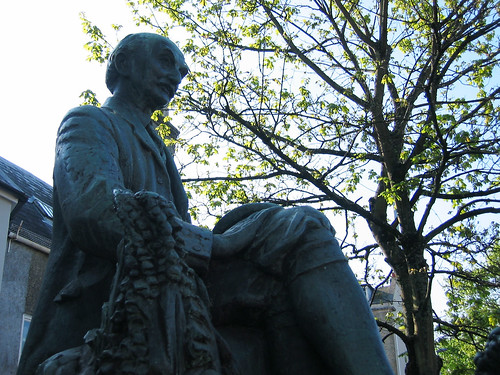1 Among the many memorable anecdotes that adorn Barbara Tuchman's The Proud Tower (1966), the mordant, grotesque black comedy of this brief scene from the life of Kaiser Wilhelm II is nearly unmatched:
[T]he Kaiser retired to the estate of his friend Prince Fursternberg, where, in the course of an evening's festivities, Count Hulsen-Haeseler, chief of the Military Cabinet, appeared in a pink ballet skirt and rose wreath and "danced beautifully," affording everybody much entertainment. On finishing he dropped dead of heart failure. Rigor mortis having set in by the time the doctors came, the General's body could only with the greatest difficulty be divested of its ballet costume and restored to the propriety of military uniform.If only the Kaiser's friends had been as resourceful as Bernie Gunther, hero of Philip Kerr's Berlin Noir, who, when confronted with a body that needed dressing and moving, knew to bend and twist and essentially massage the man to slow the onset of rigor mortis.
2 Describing the Kaiser on his accession to the throne at age twenty-nine in 1888, Tuchman writes,
His firs proclamation on his accession was addressed, not like his father's, "To My People," but, "To My Army." It announced, "We belong to each other, I and the Army; we were born for each other." The relationship he had in mind was explained in advice to a company of young recruits: "If your Emperor commands you to do so you must fire on your father and mother." His sense of personal responsibility for the affairs of Germany and of Europe was expressed in the frequent "I's" and "My's" that bedizened his talk. "There is only one master in the Reich and that is I; I shall tolerate no other." Or, some years later, "There is no balance of power in Europe but me--me and my twenty-five army corps." He was willing, however, to make room for the Almighty who figured as the "ancient Ally of my House."Which leads me to a question: did the Kaiser have any good qualities? I'm far from an expert, but in my reading about the period, I can't recall anyone having a single good thing to say about him--and that's before we take account of the fact that he was the model of the "strong man" for whose leadership many Germans yearned in the years just before Hitler' rise. Anyone willing to offer even a partial a defense of Kaiser Bill?
3 Speaking of Philip Kerr's Berlin Noir, I finally read it over the weekend on the recommendation of Sarah Weinman, and it didn't disappoint. The three novels it comprises, set in pre- and post-war Germany, show, through the eyes of a Nazi-hating former police detective, how Hitler transformed Berlin into
a big haunted house with dark corners, gloomy staircases, sinister cellars, locked rooms and a whole attic of poltergeists on the loose,and then how American and Russian bombs made it a desperate ruin. The novels are dark, emotionally and morally complicated, and fundamentally serious--to the point that when Kerr pointedly evokes Graham Greene's The Third Man in the final volume he doesn't lose by the unavoidable comparison.
One of the most memorable aspects of Berlin Noir was also one of its most casual: Kerr's constant use of unusual slang, presumably German words that were current in the period. Some examples: safe is a "nut"--and a safecracker therefore a "nutcracker"--a person in jail is "in the cement," a gun is a "lighter," a prostitute is a "snapper" or a "chocolady," a madman is a "spinner," and fingers and fingerprints are "piano players." In a book that is careful and evocative with language--where an enemy is described as showing a "razor blade of a smile"--the slang stands out, adding verisimilitude to Kerr's meticulous recreation of the mood and milieu of wartime Berlin.
